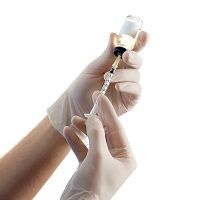Article
Single-Dose Dengue Vaccine Proves 100% Effective
Author(s):
A vaccine to combat the most common arboviral disease in the world may finally be here.

A vaccine to combat the most common arboviral disease in the world may finally be here.
Approximately 400 million people are infected with dengue each year. Even though most patients survive with minimum symptoms, the virus can develop into dengue hemorrhagic fever, which kills more than 25,000 people each year. A study led by researchers at Johns Hopkins Bloomberg School of Public Health may have found the missing piece of the dengue vaccine puzzle.
Earlier this year, a three-dose vaccine called Dengvaxia had limited availability in Mexico, Brazil, and the Philippines. Although the vaccine produced antibodies against the virus during a clinical trial and even protected against dengue during the first year of vaccination, it did not have long-lasting effects. Vaccinated children began to be hospitalized with the illness at even higher rates than those who received a placebo. This led the team at Johns Hopkins to go a step beyond just evaluating the antibodies and develop a one-dose vaccine, TV003.
In a phase 3 study, researchers in Brazil administered the vaccine to human participants. There are four strains of dengue and this vaccine proved effective against all of them.
- Related: The Latest News on Infectious Diseases
The TV003 vaccine prevented dengue strains 1, 3, and 4 well, but it did cause a strong enough immune system response on the second strain. Therefore, the John Hopkins researchers focused primarily on dengue strain 2 to see if TV003 would protect against infection six months after vaccination.
“Knowing what we know about this new vaccine, we are confident that it is going to work,” lead researcher Anna P. Durbin, MD, said in a news release. “And we have to be confident: Dengue is unique and if you don’t do it right, you can do more harm than good.”
Twenty-one adults received the TV003 vaccine and another 20 received a placebo, as described in Science Transitional Medicine. When the participants were exposed to the dengue strain 2 virus six months later, none of those in the TV003 group showed traces of infection in their blood. On the other hand, all of the people that received the placebo had the illness in their blood — 80% of which developed a rash and the other 20% had low white blood cells counts.
“What we’re trying to do is accelerate vaccine development, weeding out poor candidates before testing them in large numbers of people in places where dengue is endemic,” Durbin continued.
It was only last month that the mayor in Hawaii declared a state of emergency for a dengue outbreak. Patients commonly experience high fever, rash, severe headache, pain behind the eyes, joint, muscle, and bone pain, and mild bleeding.
Durbin said that this study could be a vaccine jump-off point for the Zika virus — another mosquito-borne illness without a vaccine or specific treatment.
Also on MD Magazine >>> Updated List of Countries Infected with Zika



